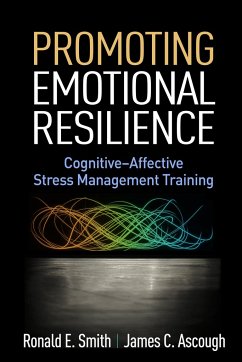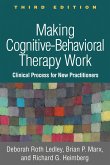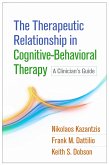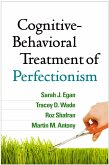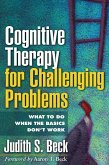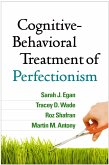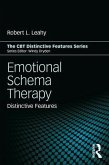Ronald E. Smith, James C. Ascough
Promoting Emotional Resilience
Cognitive-Affective Stress Management Training
Ronald E. Smith, James C. Ascough
Promoting Emotional Resilience
Cognitive-Affective Stress Management Training
- Gebundenes Buch
- Merkliste
- Auf die Merkliste
- Bewerten Bewerten
- Teilen
- Produkt teilen
- Produkterinnerung
- Produkterinnerung
Grounded in extensive research, this book presents a brief emotion-focused coping skills program that helps clients regulate their affective responses in stressful situations.
Andere Kunden interessierten sich auch für
![Making Cognitive-Behavioral Therapy Work Making Cognitive-Behavioral Therapy Work]() Deborah Roth Ledley (United States private practice)Making Cognitive-Behavioral Therapy Work43,99 €
Deborah Roth Ledley (United States private practice)Making Cognitive-Behavioral Therapy Work43,99 €![The Therapeutic Relationship in Cognitive-Behavioral Therapy The Therapeutic Relationship in Cognitive-Behavioral Therapy]() Nikolaos Kazantzis (Australia Monash University)The Therapeutic Relationship in Cognitive-Behavioral Therapy48,99 €
Nikolaos Kazantzis (Australia Monash University)The Therapeutic Relationship in Cognitive-Behavioral Therapy48,99 €![Cognitive-Behavioral Treatment of Perfectionism Cognitive-Behavioral Treatment of Perfectionism]() Sarah J. Egan (Curtin University, Perth, Australia)Cognitive-Behavioral Treatment of Perfectionism73,99 €
Sarah J. Egan (Curtin University, Perth, Australia)Cognitive-Behavioral Treatment of Perfectionism73,99 €![Cognitive Therapy for Challenging Problems Cognitive Therapy for Challenging Problems]() Beck, Judith S., Ph.D. (Bala CynwydCognitive Therapy for Challenging Problems48,99 €
Beck, Judith S., Ph.D. (Bala CynwydCognitive Therapy for Challenging Problems48,99 €![Cognitive-Behavioral Treatment of Perfectionism Cognitive-Behavioral Treatment of Perfectionism]() Sarah J. Egan (Australia Curtin University)Cognitive-Behavioral Treatment of Perfectionism48,99 €
Sarah J. Egan (Australia Curtin University)Cognitive-Behavioral Treatment of Perfectionism48,99 €![Emotional Schema Therapy Emotional Schema Therapy]() Robert L. LeahyEmotional Schema Therapy18,99 €
Robert L. LeahyEmotional Schema Therapy18,99 €![Experiencing ACT from the Inside Out Experiencing ACT from the Inside Out]() Dennis Tirch (United Sta The Center for Compassion Focused TherapyExperiencing ACT from the Inside Out54,99 €
Dennis Tirch (United Sta The Center for Compassion Focused TherapyExperiencing ACT from the Inside Out54,99 €-
-
-
Grounded in extensive research, this book presents a brief emotion-focused coping skills program that helps clients regulate their affective responses in stressful situations.
Hinweis: Dieser Artikel kann nur an eine deutsche Lieferadresse ausgeliefert werden.
Hinweis: Dieser Artikel kann nur an eine deutsche Lieferadresse ausgeliefert werden.
Produktdetails
- Produktdetails
- Verlag: Guilford Publications
- Seitenzahl: 340
- Erscheinungstermin: 27. Juni 2016
- Englisch
- Abmessung: 236mm x 161mm x 32mm
- Gewicht: 622g
- ISBN-13: 9781462526314
- ISBN-10: 1462526314
- Artikelnr.: 44031719
- Herstellerkennzeichnung
- Produktsicherheitsverantwortliche/r
- Europaallee 1
- 36244 Bad Hersfeld
- gpsr@libri.de
- Verlag: Guilford Publications
- Seitenzahl: 340
- Erscheinungstermin: 27. Juni 2016
- Englisch
- Abmessung: 236mm x 161mm x 32mm
- Gewicht: 622g
- ISBN-13: 9781462526314
- ISBN-10: 1462526314
- Artikelnr.: 44031719
- Herstellerkennzeichnung
- Produktsicherheitsverantwortliche/r
- Europaallee 1
- 36244 Bad Hersfeld
- gpsr@libri.de
Ronald E. Smith, PhD, is Professor of Psychology and Director of Clinical Training at the University of Washington, where he also has served as head of the Social Psychology and Personality Program. His major professional interests are psychological stress and coping, therapeutic assessment, and performance enhancement research and intervention. A past president of the Association for Applied Sport Psychology, Dr. Smith's publications include numerous books and more than 200 articles and book chapters, over 60 of which are in the areas of anxiety, stress, and coping. James C. Ascough, PhD, is in part-time private practice at Mascouten Associates in West Lafayette, Indiana. He served on the faculties of the University of Georgia and Purdue University, and was Director of Child and Adolescent Services at Wabash Valley Hospital in West Lafayette, Indiana. Dr. Ascough's research focused on autonomic nervous system arousal, measures of affect, and models of cognitive imagery and behavior change. He is a recipient of the Sagamore of the Wabash Award, Indiana's highest state honor, for his contributions to youth mental health.
Introduction and Overview
1. Emotion, Stress, and Coping: Implications for Intervention
2. An Overview of Cognitive-Affective Stress Management Training
3. Affect Elicitation in Psychotherapy: The Induced Affect Technique
4. Preparation, Assessment, and Session 1
5. Session 2: Cognitive Coping Skills--Introduction to Cognitive
Restructuring and Self Instructional Training
6. Session 3: Induced Affect Reduction Using Relaxation and the Integrated
Coping Response
7. Session 4: Induced Affect Skills Rehearsal and Introduction to
Meditation and Mindfulness
8. Session 5: Integrated Coping Response Practice, Acceptance, and
Cognitive Defusion Training
9. Session 6: Coping Skills Rehearsal and Additional Cognitive-Behavioral
Strategies
Appendix A: Handouts and Forms for Clients
Appendix B: Materials for Therapists/Trainers
References
1. Emotion, Stress, and Coping: Implications for Intervention
2. An Overview of Cognitive-Affective Stress Management Training
3. Affect Elicitation in Psychotherapy: The Induced Affect Technique
4. Preparation, Assessment, and Session 1
5. Session 2: Cognitive Coping Skills--Introduction to Cognitive
Restructuring and Self Instructional Training
6. Session 3: Induced Affect Reduction Using Relaxation and the Integrated
Coping Response
7. Session 4: Induced Affect Skills Rehearsal and Introduction to
Meditation and Mindfulness
8. Session 5: Integrated Coping Response Practice, Acceptance, and
Cognitive Defusion Training
9. Session 6: Coping Skills Rehearsal and Additional Cognitive-Behavioral
Strategies
Appendix A: Handouts and Forms for Clients
Appendix B: Materials for Therapists/Trainers
References
Introduction and Overview
1. Emotion, Stress, and Coping: Implications for Intervention
2. An Overview of Cognitive-Affective Stress Management Training
3. Affect Elicitation in Psychotherapy: The Induced Affect Technique
4. Preparation, Assessment, and Session 1
5. Session 2: Cognitive Coping Skills--Introduction to Cognitive
Restructuring and Self Instructional Training
6. Session 3: Induced Affect Reduction Using Relaxation and the Integrated
Coping Response
7. Session 4: Induced Affect Skills Rehearsal and Introduction to
Meditation and Mindfulness
8. Session 5: Integrated Coping Response Practice, Acceptance, and
Cognitive Defusion Training
9. Session 6: Coping Skills Rehearsal and Additional Cognitive-Behavioral
Strategies
Appendix A: Handouts and Forms for Clients
Appendix B: Materials for Therapists/Trainers
References
1. Emotion, Stress, and Coping: Implications for Intervention
2. An Overview of Cognitive-Affective Stress Management Training
3. Affect Elicitation in Psychotherapy: The Induced Affect Technique
4. Preparation, Assessment, and Session 1
5. Session 2: Cognitive Coping Skills--Introduction to Cognitive
Restructuring and Self Instructional Training
6. Session 3: Induced Affect Reduction Using Relaxation and the Integrated
Coping Response
7. Session 4: Induced Affect Skills Rehearsal and Introduction to
Meditation and Mindfulness
8. Session 5: Integrated Coping Response Practice, Acceptance, and
Cognitive Defusion Training
9. Session 6: Coping Skills Rehearsal and Additional Cognitive-Behavioral
Strategies
Appendix A: Handouts and Forms for Clients
Appendix B: Materials for Therapists/Trainers
References

